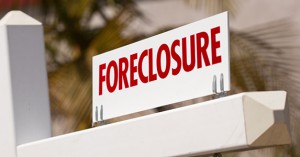How Can Your Foreclosure Affect You?
No one wants to foreclose, but it happens if you fall behind on your mortgage payments and have no way of catching up. While you want to move on from the whole experience, your credit score won’t let you.
A foreclosure can hit your credit up to 300 points, and if you’ve missed several mortgage payments before filing for foreclosure, it can negatively impact your credit score even more. A foreclosure appears on your credit report as of the date you file, not the date of sale. It stays on your credit report for seven years.
Besides carrying around the foreclosure on your credit report for years, what other affects can foreclosures have on your life?
Foreclosures and Family
After the housing bubble burst in 2008, foreclosure rates increased substantially. Many families lost their homes to foreclosure. 
Studies demonstrate that families who faced foreclosure saw their earnings fall more than families who did not experience foreclosure. After one earner lost his or her job, foreclosure was nearly inevitable. Moreover, families who lost homes to foreclosure were more likely to seek government assistance programs for support. They also tend to double up or share their home after filing for foreclosure, but before the house is sold.
Bankruptcy and Foreclosure
If you are contemplating bankruptcy, you may also be facing foreclosure. If you fall three months behind on your mortgage payments, it may be beneficial to think about filing for bankruptcy to avoid foreclosure. Although financially, bankruptcy is considered a “last-resort” option, it can hold off creditors, including your mortgage company, while you’re sorting out your financial troubles.
Bankruptcy only prevents foreclosure in some cases. If you file for Chapter 7 bankruptcy, it means you don’t have the financial means to pay any of your bills. In that regard, the bankruptcy releases you from your obligation to pay your debts. However, Chapter 7 bankruptcy does not prevent foreclosures. While your obligation to repay is released, the lien on the house isn’t canceled because it serves as collateral if you cannot repay. With Chapter 7 bankruptcy, the homeowner often surrenders his or her home.
Chapter 13 bankruptcy gives the debtor an opportunity to work out a new agreement with the lender. Lenders can come to an agreement with the debtor consisting of paying off the late payments and late interest for up to 5 years as part of a new loan agreement. If you can pay the new loan payment and make all your payments on time, after the five years are completed, you can keep your home.
It is important to note that while bankruptcy and foreclosure have a negative impact on your credit, foreclosures remain on your credit report for seven years, whereas bankruptcies remain for ten years. Nevertheless, creditors look at foreclosures more seriously than bankruptcy that don’t include a house.
Foreclosures and Your Estate Plan
If you inherit a house that is behind on its mortgage payments or already in foreclosure, you have a couple options. Assuming the homeowner is behind on mortgage payments, the person to whom the house is left does not have to accept the inheritance or the debt associated with the property. If the beneficiary can’t afford the mortgage payments, insurance or maintenance, the beneficiary may disclaim the property and it would be passed to the next person designated. If no one claims the property, the home would likely go into foreclosure.
If the house is going into foreclosure, you want to make sure the house is not in your name and is still the property of the estate. If it is in your name, the foreclosure will affect your credit. If not, it has no bearing on your credit. In that case, the estate may be responsible for the deficiency judgment.
Foreclosure and Divorce
Financial problems are cited as one of the leading causes of divorce, so it should come as no surprise that foreclosures and divorce often go hand-in-hand. If you’re behind on your mortgage and going through a divorce, you must figure out who is responsible for the mortgage debt.
Many couples take out their mortgage and hold title jointly. In that case, both parties are responsible for the debt. However, if either spouse holds title in his or her name alone, that spouse is solely responsible for the debt and is the only person the bank may pursue for any deficiency judgment after a foreclosure.


Comments